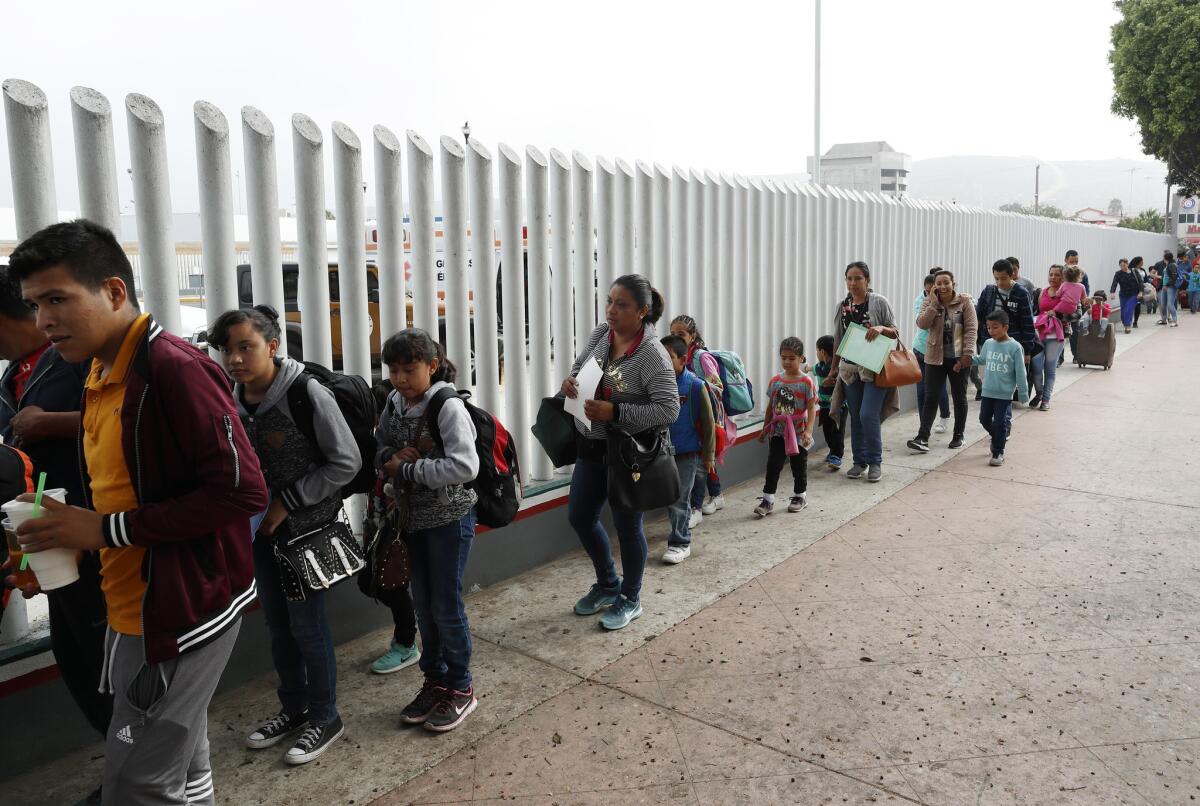Trump is now forcing children to go it alone in immigration court

- Share via
The Justice Department recently issued a policy memo that would limit the access of noncitizens to legal assistance in immigration courts, the latest in a series of attacks on immigrants. As it is, people appearing in immigration court do not have a right to government-appointed counsel. Instead, they have to hire and pay for a private lawyer themselves or be fortunate enough to find a pro bono lawyer.
Because of the huge volume of cases in immigration court, there are simply not enough pro bono lawyers to represent the thousands of adults and children in removal proceedings. To fill this gap, nonprofits like the Justice & Diversity Center of the Bar Assn. of San Francisco, where I work, provide limited-scope legal services by appearing as “friend of the court,” or amicus curiae, in immigration court. In this role, these volunteers provide free legal information, help noncitizens identify what immigration benefits they may be eligible for, assist in filling out and filing immigration forms and other papers, and help them speak to the judge in open court.
Such assistance is crucial for vulnerable individuals, including unaccompanied children, trafficking and other crime victims and individuals who have serious mental health disabilities. These individuals, who have often gone through severe trauma, are entirely unable to navigate the complex immigration system alone. By helping them, even in a limited capacity, the friends of the court also help the courts in processing cases. This work is more important now than ever with immigration judges handling more cases in less time under the administration’s new performance quotas.
The new memo, issued by the Justice Department’s Executive Office for Immigration Review, would redefine the role of friends of the court and prohibit anyone in that role from speaking on behalf of unrepresented individuals in open court.
The memo purports to be protecting immigrants from confusion and clarifying that friends of the court cannot play an advocacy role in immigration court. But the new directive was not created to protect immigrants. Volunteers with nonprofit organizations that do this work are already well trained to explain their limited role so that there is no blurring of lines between full-scope legal representation and help from a friend of the court.
The implementation of the memo will harm thousands of unrepresented noncitizens who face deportation every day. It will limit their access to information and assistance. And it will prevent them from having volunteers speak for them in court. Without this option, many won’t be able to ask the court important questions about their cases, articulate their requests, and present claims for immigration relief.
Immigration courts have long valued this kind of volunteer assistance. Nearly 30 years ago, the Bar Assn. of San Francisco started a friend of the court program at the request of the San Francisco Immigration Court. As a former volunteer in that program and then as an immigration judge in that court, I saw how big a difference this work makes for the administration of the court. The friend-of-the-court volunteer can inform immigrants about their rights, responsibilities, and eligibility for immigration benefits before they speak to the judge. That can make court hearings far more efficient because judges rarely have time to explain the complex process or provide answers to all follow-up questions during a hearing.
The current administration has made every effort to deprive humane aid to people seeking safety in this country. Now it’s senselessly eroding due process for the most vulnerable by clamping down on the assistance they need. This new tactic exacerbates the lack of fairness that is endemic in the immigration court system.
Ilyce Shugall is the director of the Immigrant Legal Defense Program at the Justice & Diversity Center of the Bar Assn. of San Francisco.
More to Read
A cure for the common opinion
Get thought-provoking perspectives with our weekly newsletter.
You may occasionally receive promotional content from the Los Angeles Times.









